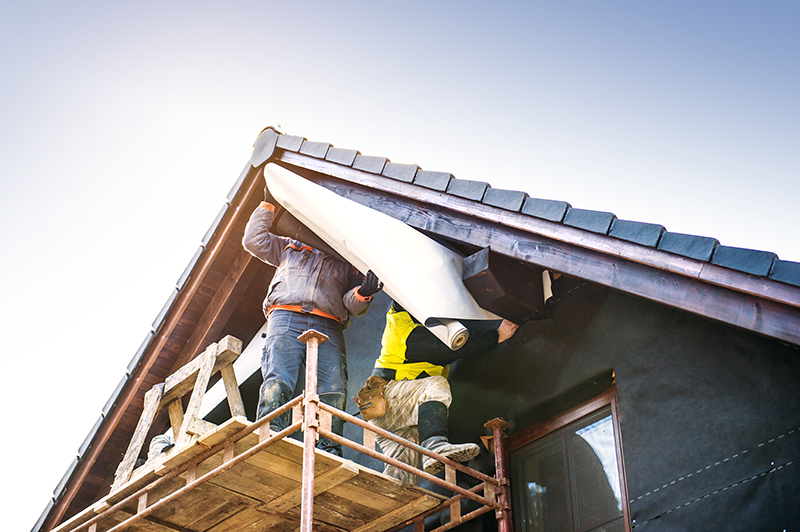Being able to finance a house flip can put you well on your way to a very lucrative endeavor. It’s important to know, however, that finding a loan to back your fix-and-flip project is very different than obtaining a loan for a home you plan to use as your primary residence.
There are specific “fix-and-flip loans,” that will fund your renovation project, but each comes with specific qualification criteria. Take a look at the house flip loan options to determine which is best for you.
Hard-Money Loan
Hard-money loans come from private lenders. A group or single individual will use personal cash to fund a short-term loan. Most hard-money loans are designed for six to 12 months, but can extend up to five years. Interest rates with these loans are typically higher than those of traditional bank loans – 12 to 21 percent – and you can expect to pay a 25 to 35 percent down payment as most hard-money loans only cover three-fourths of the property value.
Cash-Out Refinance
If you have equity built up in your personal home, one option for house flipping cash is to refinance your mortgage for more than you currently owe and use the difference to fund your project. For example, if your original home loan was for $400,000 and you’ve paid half of that, you could cash out $50,000 of that equity and get a new mortgage for $250,000 in replace of your $200,000 remaining loan. As with any home loan, you must meet certain requirements, like a 640 credit score, maximum 45 percent debt-to-income ratio, and roughly 40 percent equity in your home.
Home Equity Loan
You can tap into the equity you’ve built up in your primary home through a home equity loan. A home equity loan provides you with cash up front and allows you to pay it back in monthly installments. Most lenders will allow you to borrow up to 80 percent of your home’s equity and interest rates are fairly low.
Investment Line Of Credit
An investment line of credit is designed specifically for investment properties. The loans have short financing parameters – typically 18 to 24 months – and you can borrow cash as needed up to your approved amount. This loan type is often used by experienced flippers as borrows are approved, in part, on their track record of owning or flipping investment properties and their financial track record.
Peer-To-Peer Lending
House flippers can use peer-to-peer lending, or crowdfunding, to cover project costs. Companies like RealtyShares finance investment properties in numerous states. Thousands of investors come together to invest in a specific property or project. Interest rates vary from eight to 11 percent with crowdfunding and the average loan term for a luxury flip on RealtyShares is 12 months.
Buying, renovating, and reselling homes can be a profitable business when you research which loan type best fits your needs and timeline.
Hard-money loans come from private lenders. A group or single individual will use personal cash to fund a short-term loan. Most hard-money loans are designed for six to 12 months, but can extend up to five years. Interest rates with these loans are typically higher than those of traditional bank loans – 12 to 21 percent – and you can expect to pay a 25 to 35 percent down payment as most hard-money loans only cover three-fourths of the property value.If you have equity built up in your personal home, one option for house flipping cash is to refinance your mortgage for more than you currently owe and use the difference to fund your project. For example, if your original home loan was for $400,000 and you’ve paid half of that, you could cash out $50,000 of that equity and get a new mortgage for $250,000 in replace of your $200,000 remaining loan. As with any home loan, you must meet certain requirements, like a 640 credit score, maximum 45 percent debt-to-income ratio, and roughly 40 percent equity in your home.You can tap into the equity you’ve built up in your primary home through a home equity loan. A home equity loan provides you with cash up front and allows you to pay it back in monthly installments. Most lenders will allow you to borrow up to 80 percent of your home’s equity and interest rates are fairly low.An investment line of credit is designed specifically for investment properties. The loans have short financing parameters – typically 18 to 24 months – and you can borrow cash as needed up to your approved amount. This loan type is often used by experienced flippers as borrows are approved, in part, on their track record of owning or flipping investment properties and their financial track record.House flippers can use peer-to-peer lending, or crowdfunding, to cover project costs. Companies like RealtyShares finance investment properties in numerous states. Thousands of investors come together to invest in a specific property or project. Interest rates vary from eight to 11 percent with crowdfunding and the average loan term for a luxury flip on RealtyShares is 12 months.
Buying, renovating, and reselling homes can be a profitable business when you research which loan type best fits your needs and timeline.


